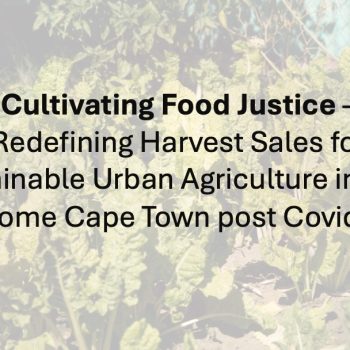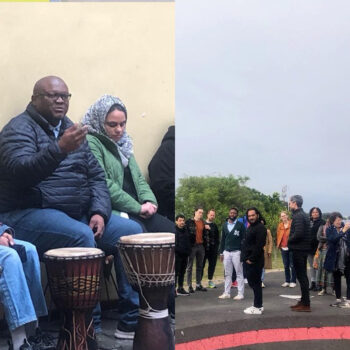MA in Sustainable Urban Practice
The complex, multi-dimensional demands of our rapidly urbanising world require holistic, inter-disciplinary thinking and practice. However traditional professional paradigms and often-siloed institutions seem doomed to replicate the entrenched patterns and practices of path-dependent urban infrastructure provision and management.
To overcome the often-fragmented ways in which urban questions are framed, institutionalised, and engaged by varied levels of government, citizens, civil society organisations, and private sector actors, we need a new kind of urban practitioner, who can work across practices, professional norms, hierarchies, sectors and urban problems.
The Masters in Sustainable Urban Practice (MSUP) cultivates urban integrators who are able to discern opportunities for integration, and can build the necessary coalitions for change; who are confident in varied cultures of communication and can build bridges between sectors, fields, and scales of urban practice.
WHO SHOULD APPLY
This programme is aimed at mid-career urban professionals in either government, civil society, or in the private sector, who have realised the limits of their practice. The programme provides students with specialist knowledge of urban theoretical frameworks, and schools them in the critical and analytical tools to assess these from a global South perspective.
Students will be equipped to bridge theory and practice by appropriately applying theory to real life cases and complex problems in individual research projects.
This is a professional masters designed to allow students to continue working. Courses are presented in block weeks and scheduled across the year. The programme explicitly offers a space for students to bring their own work and experience into the learning process.
On completing this degree graduates will be able to return to practice confident in imagining and enacting integrated and innovative forms of urban practice in various spheres.
Core faculty
Professor Edgar Pieterse
Edgar Pieterse is the director of the African Centre for Cities and holds the South African Research Chair in Urban Policy, both at the University of Cape Town.
Dr Liza Rose Cirolia
Liza Rose Cirolia is a senior researcher at the African Centre for Cities and lecturer of two of the core modules
Dr Mercy Brown-Luthango
Mercy Brown-Luthango is a senior researcher and the convenor of the Masters in Sustainable Urban Practice.
Core courses
Sustainable Urban Transitions
Through a literature-based conceptual framework about the relationship between the nature of urbanisation, its likely trajectory and the operating systems of cities, students will develop an understanding of differential patterns and drivers of urbanisation, specifically in Africa. The value of systems thinking to understand complexity will serve as the conceptual anchorage for the module. These operating systems include ‘hard’ and ‘soft’ infrastructure networks, the built environment and regulatory institutions that underpin the design and governance of such systems. Learning will be facilitated through case studies from different geographies in the global South and serve to anchor the concepts and policy questions that animate the module.
Sustainable Urban Infrastructure
This module builds an understanding of contemporary policy debates on the most suitable infrastructure approaches for countries and cities marked by large-scale poverty, (spatial) inequality, limited public resources and exposed to dramatic environmental pressures. The course also explores the implications of pursuing sustainable urbanism through the lens of various infrastructure sectors. Finally, it reflects on the institutional, political and policy implications of adopting a hybrid infrastructure perspective in analysing the potential of sustainable infrastructure deployment in the global South.
Urban Infrastructure Finance
City governments are at the coalface of responding to the various challenges and demands created by fast-paced urbanisation in cities of the South. This often occurs within an institutional environment characterised by severe
financial constraints and other organisational limitations. This requires innovative thinking and capacity for experimentation amongst local government practitioners to explore alternative financing mechanisms. Students will become versed in the urban finance lexicon, develop an understanding of contemporary debates related to
financing the development of urban areas and city governments.
Adaptive Urban Management
This module will explore a coherent conceptual framework to understand the institutional, managerial and political implications of steering sustainable urban transitions. Central to this is an understanding of the political economy of policies to pursue sustainable urban transitions and identifying the leverage points in a complex and conflictual urban system to advance experimentation and innovation. Students will be equipped to map, interpret and devise regulatory modes and practices of urban intervention that are capable of addressing the most pressing
problems of our cities and transforming the places where people live.
Elective courses
Urban Food Systems Governance
Traditionally food insecurity has been seen as a rural challenge, yet thinking of food systems at an urban scale is essential to nourished, healthy Southern cities of the future. The module works from the premise that high levels of urban food insecurity observed across cities of the South are the result of poorly framed and mandated policies, that food insecurity is driven by changes in the food system, and that spatial and structural issues
drive urban food insecurity. These challenges are all reinforced in cities where the food insecure rely on the market as a means to ensure food availability. The module interrogates the urban food system challenges in cities of the global South, why these challenges exist and persist and the importance of such a focus in rapidly
urbanising countries, regions and cities. We explore how the food system intersects with the urban system, why food systems governance is important and engage the multiple governance approaches applied.
Urban Health and the Built Environment
How does the urban environment shape and influence the health and well-being of its inhabitants? This module explores the connections between the urban environment and health, focussing on understanding health behaviours and the social determinants of health. Students will gain an understanding of the Urban Health field, which includes health geography theory, the history of urban health thinking and the burden of disease in Africa and South Africa. The module includes a focus on urban health data and ethics, looking at data use and its limitations, feedback loops, examples of ethical failures in practice, as well as data solutions and urban health interventions – from international to local.
Climate Change and the City
The Sustainable Development Goals and recent Intergovernmental Panel on Climate Change reports recognise that cities have the potential to drive decarbonisation, climate resilience and economic growth. This module aims to familiarise students with climate change and development challenges at the city scale, and to equip them to provide advice and establish workable priorities on development decisions at this scale. To this aim, the module systematically works through how climate impacts, adaptation and mitigation, as well as broader agendas of systemic change intersect with the key dimensions of urban development. Students will engage critically with the two dominant theoretical framings of climate impacts and actions: risk and resilience. Students will develop an understanding of the risks and opportunities posed by climate change to African urbanisation, and by African urbanisation to climate change, as well as the international climate change science-policy-advocacy context influencing the development trajectories of (African) cities.
Creative City Theory, Policy and Practice
This module explores the nexus of culture and creativity and sustainable, just African cities, through imaginative and innovative approaches to planning, governance and citizenship. Using global case studies, the module will look at creative city-making as well as unpacking the ways in which the notion of Creative Cities has landed within UNESCO as a networking opportunity between cities linked to art, culture and heritage. The case studies will evidence that these kinds of development can have liberating effects on people and places, but can also run the risk of reinforcing inequalities – most typically seen in critiques of gentrification. Drawing on examples from the UNESCO’s Creative Cities Network, the module asks, what does a creative African city look like? It explores the role of tangible and intangible heritage in urban sustainability and justice. It introduces cultural mapping, planning and impact assessment as a tactic for mobilising cultural values. Drawing on exmples from Africa and the global South, the module asks how can culture-based development foster civic creativity and urban well-being?
Adaptive Smart Cities
There is widespread media coverage of so-called ‘smart cities’ and the transformational possibilities of Information and Communication Technologies (ICT), to develop, deploy, and promote sustainable development practices to address urbanisation challenges. The purpose of this course is to explore the intersection of technology and cities, concentrating on a series of case studies from African cities. Students will develop insight into smart cities and platform urbanism theory and practice, and how technology can be used for e-governance; civic action and citizenship; innovation; and the delivery of services. The module takes a socio-technical lens to understand the relationship between technology and society, demystifying tech utopias and dystopias. It unpacks phenomena like blockchain and what digital data means for cities. It explores how platformed paratransit (motorcycle) mobility is shifting urban accessibility, and how tech infrastructure is shaping how governments and urban residents are connecting to opportunities in unprecedented ways. Ultimately, the course explores how digitisation can foster more accessible, sustainable and just cities.
Social Power and Spatial Justice
In the context of fast-paced urbanisation in Africa and other parts of the Global South, cities have become sites of contestation over space, access to infrastructure, services and other livelihoods opportunities. This raises important questions about belonging, inclusion/exclusion, social and spatial justice, rights – who can claim rights and the strategies used to contest rights and advance social and spatial justice. Many cities are still battling to overcome the remnants of historical processes which have created deep rooted spatial and socio-economic inequalities and patterns of exclusion which have had devastating impacts on the lives of the most marginalised. South African cities are struggling to reverse the legacy of Apartheid spatial planning and to bring about social and spatial justice. Within this context, this course aims to help students think through the factors, historic moments (the cracks) which enable social change and can bring about more inclusive cities. The course aims, in particular, to answer the following questions: What is the historic moment we are currently in? What are the possibilities and opportunities? How can we take advantage of these to realise spatial justice?
How to apply
Applicants need to complete the University of Cape Town application process.
The application form will require the following:
– Select ‘Master of Sustainable Urban Practice’ from the Engineering and Built-Environment Faculty course offerings
– Registration date Feb 2024
– Course code EM035APG14
For more information read the 2024 Directions for Postgraduate Applicants.
Deadline for applications: 31 October 2023
Requirements
Prospective students automatically qualify to apply, if they have an NQF level 8 honours/PGDip or four-year bachelor degree obtained from a recognised university. The discipline of the prior degree is not prescribed.
Applicants with an NQF level 7 three-year Bachelor’s degree from a university or a Bachelor of Technology degree from a university of technology need to demonstrate at least five years of relevant work experience post-qualification, as well as satisfactory academic performance (deemed to be a > 60% mean course mark for the entire qualification or in the final year of study) in order to be considered. This work experience has to be more than 5 years and has to relate to urban development work, whether in the private, public or NGO sector. Furthermore, work experience will also be assessed in terms of the professional responsibilities they have performed and the skills they have demonstrated, as presented in their curriculum vitae. Where deemed necessary, former and/or current employer references will be contacted for their assessment of the suitability of the applicant for postgraduate study.
Contacts
Course convenor
Dr Mercy Brown-Luthango
mercy.brown-luthango@uct.ac.za
Postgraduate administrator
Faranaaz Bennett
faranaaz.bennett@uct.ac.za
+27 (0)21 650 1606


